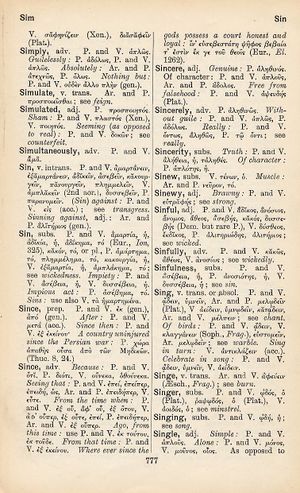simulate: Difference between revisions
From LSJ
Λῦπαι γὰρ ἀνθρώποισι τίκτουσιν νόσους → Tristitia morbos parturit mortalibus → Krankheit gebären Menschen Kümmernis und Leid
(3_12) |
m (Woodhouse1 replacement) |
||
| Line 1: | Line 1: | ||
{{Woodhouse1 | {{Woodhouse1 | ||
|Text=[[File:woodhouse_777.jpg|thumb|link={{filepath:woodhouse_777.jpg}}]] | |Text=[[File:woodhouse_777.jpg|thumb|link={{filepath:woodhouse_777.jpg}}]] | ||
===verb transitive=== | |||
Ar. and P. προσποιεῖσθαι; see [[feign]]. | [[Aristophanes|Ar.]] and [[prose|P.]] [[προσποιεῖσθαι]]; see [[feign]]. | ||
}} | }} | ||
{{Gaffiot | {{Gaffiot | ||
Revision as of 09:20, 20 May 2020
English > Greek (Woodhouse)
verb transitive
Ar. and P. προσποιεῖσθαι; see feign.
Latin > French (Gaffiot 2016)
sĭmŭlātē¹⁴ (simulo), d’une manière simulée, par feinte : Cic. Nat. 2, 168 ; Q. 1, 1, 13 || simulatius Anth. 476, 4.
Latin > German (Georges)
simulātē, Adv. (simulatus v. simulo), zum Scheine, mit Verstellung, Cic. Rabir. Post. 33; de off. 3, 68: Ggstz. vere, Cic. in Pis. 27: Ggstz. ex animo, Cic. de nat. deor. 2, 168: verb. ficte et simulate, Cic. ad Q. fr. 1, 1, 4. § 13. – Compar., simulatius exit proditionis opus, Petron. poët. fr. 28, 4.

